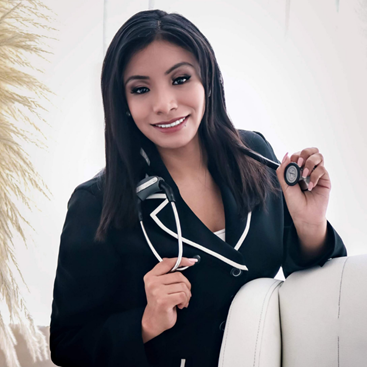The Blood Sisters Project



Burnout, a well-recognized and growing problem in medicine, is a syndrome characterized by emotional exhaustion, depersonalization, and a lack of sense of personal accomplishment.1 Hematology/oncology (HO) is a highly demanding field, and HO physicians are susceptible to burnout, with around one in three HO fellows reporting burnout symptoms.2,3 The prevalence of burnout in female-identifying physicians is higher than in men, and women physicians often experience stress and burnout differently than their male counterparts.4 Factors contributing to burnout that are specific to women physicians include increased dissatisfaction with work-life integration, gender bias, and slower professional advancement.2,5 These additional stresses cause further challenges for female-identifying trainees in this field.
Dr. Ariela Marshall and I met virtually in June of 2019, thanks to an email introduction by a mutual friend. We bonded over our shared interest in medical education and trainee/physician wellness. Six months later, we finally met in person at the 2019 ASH Annual Meeting. Inspired by our conversations regarding wellness, we brainstormed ways to collaborate on a meaningful project and decided to participate in the ASH EQUIPS Trainee Competition at the 2020 ASH Annual Meeting. The competition topic was physician burnout.
We entered the competition with a project titled “Blood Sisters,” which aims to increase resilience, reduce burnout, and improve participants’ professional quality of life. The program, which functions in collaboration with ASH, is designed as a structured mentorship buddy program for women HO fellows. The buddy system has previously been described as an effective method to support trainees, monitor stress, and improve wellbeing.6,7 We plan to pair first-year women HO fellows (“younger sisters”) with second- or third-year HO fellows (“older sisters”). The program will be advertised to ASH members-in-training on Hematopoiesis, the new newsletter by the ASH Trainee Council. Interested fellows will be invited to complete an electronic survey that collects demographic data, career interests/preferences, and baseline professional quality of life. Participants will receive a program resource pack that will include participants’ roles and responsibilities, a code of conduct, a confidentiality plan, emergency contact details, and additional information/education about burnout and wellness.
Blood Sisters will be expected to virtually check-in with each other at a frequency of at least once per month. Check-ins will be peer-initiated meetings at times as well as virtual platforms of mutual convenience. The communication should be bidirectional. Older sisters will mentor younger sisters on resilience skills and maintaining wellbeing in medicine, expanding their own professional networks, and developing their mentoring skills. Younger sisters will receive one-on-one assistance from a single point of accessible contact, gain early networking opportunities, and learn about peer perspectives on work-life balance. The program will create a sense of community and increase opportunities for professional development.
Professional quality of life will be re-assessed via a RedCap survey after six months, at which point participants will also be asked to provide open-ended feedback about the program. Sisters will have the opportunity to meet face to face annually during the ASH Annual Meeting Women in Medicine event. All participants will take an exit survey at the end of the year, which will include the Professional Quality of Life Scale (ProQoL) and open-ended feedback about the program. The information gained from the program will be helpful not only for trainees but also for HO program leaders to increase awareness of trainee needs regarding quality of life and burnout prevention.
In July 2020, we were notified that our project was one of four finalists in the ASH EQUIPS Trainee Competition. Participants in the competition were asked to pre-record their presentation and answer questions via a live stream for the ASH annual meeting in December 2020. At the time, I was a medical student and community medical center intern in Lima, Peru. Despite limited financial resources and additional challenges related to the COVID-19 pandemic, I created a homemade video with the help of friends who studied visual communications. Despite my being very nervous and almost forgetting how to speak English (not my native language), I was able to answer the live-stream questions successfully. The outcome of the competition was decided by online voting, and I am thrilled to say that our project won! This has been an incredible experience so far in terms of medical education, wellness research, and meaningful project development. We are currently working with ASH to implement the project and are very excited to see how it progresses.
If you are interested in participating in Blood Sisters, please fill out this online form.
- Schaufeli WB, Leiter MP, Maslach C. Burnout: 35 years of research and practice. Career Dev Int. 2009;14:204-220.
- Graff SL, Close J, Cole S, et al. Impact of closed Facebook group participation on female hematology/oncology physicians. J Oncol Pract. 2018;14:e758-e769.
- Richardson DR, Tan X, Winzelberg G, et al. Development of an Art of Oncology Curriculum to mitigate burnout and foster solidarity among hematology/oncology fellows. JCO Oncol Pract. 2020;16:e384-e394.
- Chesak SS, Cutshall S, Anderson A, et al. Burnout among women physicians: a call to action. Curr Cardiol Rep. 2020;22:45.
- Templeton K, Bernstein C, Sukhera L, et al. Gender-based differences in burnout: Issues faced by women physicians. NAM Perspectives. Discussion Paper, National Academy of Medicine, Washington, DC. Doi: 10.31478/201905a.
- Chanchlani S, Chang D, Ong JS, et al. The value of peer mentoring for the psychosocial wellbeing of junior doctors: a randomised controlled study. Med J Aust. 2018;209:401-405.
- Llewellyn A. The benefit of buddy systems in medicine. AdvanceMed. Blog, Medical Education. 2019.